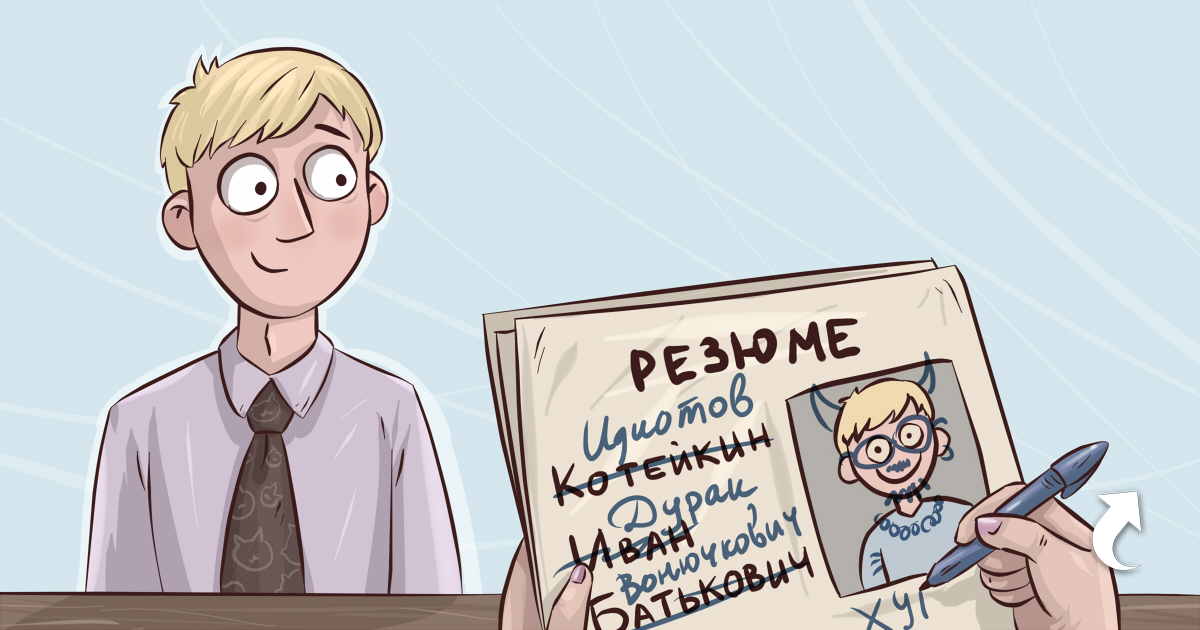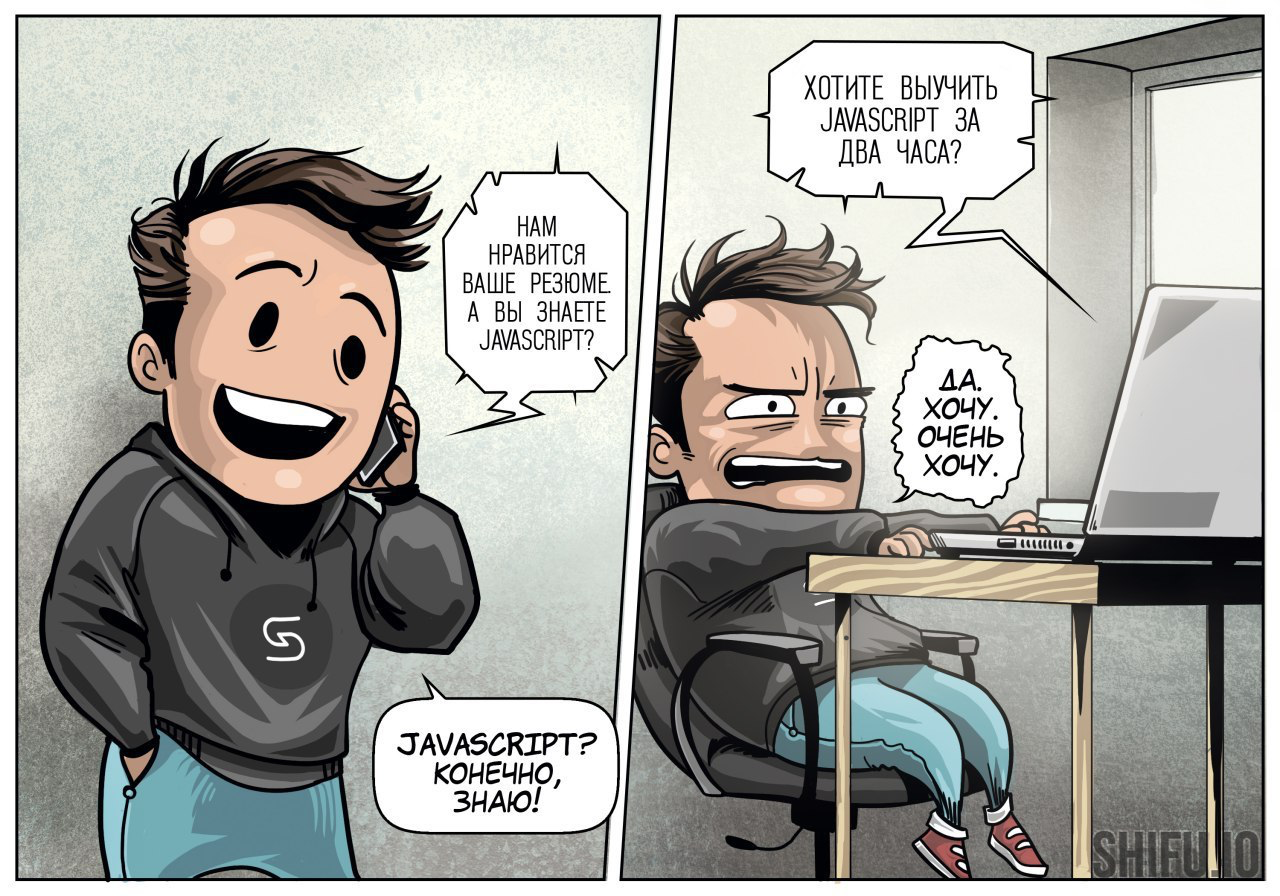
This is the first part of our new series “Work is not a wolf,” which will consist of five parts, each of which reveals the most important aspects related to employment. As with the education cycle, articles will be subjective, honest, and based on extensive expertise. Here is what awaits you:
Part 1. Job Search: Sources, Resumes, HR Interviews
Part 2. Device and adaptation: interview with the boss, we pass the trial period with a breeze
Part 3. Work as a newcomer: growth in the company
Part 4. Work as an experienced employee: how not to burn out
Part 5. Dismissal: I am leaving beautifully
We are waiting for your stories in the comments - let as many Habr readers as possible be able to look for work without fear, find success and work with confidence.
How we seek work and work seeks us
Regardless of education, there are several ways to find a new job, each of which has its own advantages and serious pitfalls.
▍On work sites
You create a resume, post it on My Circle or Headhunter, respond to vacancies or wait for the employer to invite you for an interview. Once this form seemed progressive and advanced, today it retains its position, but requires transformation for a number of reasons.
- Often, the applicant simply sends out a resume to all more or less suitable employers, and the employer invites you to an interview without looking at the specialization of the future employee. This significantly spends time on both sides, and sometimes leads to overt mistakes in hiring, when working relationships add up to hopelessness (“We need a good Java programmer, but we are not ready to pay him, let's take this yesterday’s student with a PHP course student”).
- Distribution of resumes is a rather passive way of finding a job that does not require special efforts from the applicant (the maximum is to write a cover letter).
- Such a format is essentially blind acquaintance: you can find a minimum of information from a resume about a job seeker, and sometimes you can’t find out anything from a job description (a dynamic young collective of like-minded people often hides a bitchy team of jerkers and lazy people).
If you choose this method of job search, I will give you some recommendations:
- do not write your entire history of work in the resume, specify with details only those places and positions that relate to future work (if you are now a middle C ++, do not care for everyone that you worked at McDonald's and the bookstore)
- create a few resumes with an emphasis on various areas of search (for example, marketing manager, head of marketing, head of external communications, etc.) - although the difference is small, but correctly placed accents decide
- place in the resume only a business photo or do not place at all
- if you specify a social network, make sure that the account is open or partially open and full (they are checked not only by HR, but also by your potential future colleagues)
- do not write banalities in the resume (I am active, trained, etc.) and do not spread about hobbies (“hobbies: Formula 1”, and not “hobbies: Formula 1, was at the Monaco Grand Prix 2017, Russia 2018, Japan 2016 ; I support Vettel; Red Bull sucks ")
- always write a good, detailed cover letter: why did you choose this particular company, that you are ready to give it
- Avoid any familiarity, rudeness, and vulgarity (“I want to work in your company exactly - its performance in the industry is amazing, the team admires and, of course, a careless product ideal for the market”).

▍ Direct contact with the company
A great way to find a good, suitable job is to contact the company directly and offer to consider your resume: send by email, write on social networks. Thus, you not only inform about yourself, but also demonstrate involvement. Such an approach requires not a silent “throwing a resume”, but a thoughtful cover letter in which you will tell why you are interested in the company, what you know about it (at any level of knowledge - state only open information!) That you are ready to bring to the work and product . Such letters seldom go unnoticed, but it’s best to call and clarify after a couple of days if you’ve seen your information (it’s difficult right up to the first “Hello”, you are a cool specialist, you sell yourself, do not be shy).
What do you need to keep in mind?
- Your letter may fall into the wrong hands, so always try to find a) the address of your unit directly; b) HR address; c) general address. You can send them to all three at once, this is not shameful - this will increase the likelihood that the company will not ignore the letter, but at least discuss it among themselves.
- Do not write personal messages on social networks to company executives and its employees if you are not personally acquainted with them or at least not represented.
- If you received a refusal with this form of submitting a resume, this is a more “ironic” refusal, do not understand the reasons and try to break through the wall again.
- The company may not have vacancies and you will receive a rejection. If the refusal is polite and you have contact with the respondent, ask to include your resume in the personnel reserve of the company and say that if there are vacancies, you will be happy to consider them (if the company is really interesting to you).
▍On recommendation (not to pull!)
HR in all areas, and especially in IT, has vast communities and local groups and chats where they share resumes of specialists, place requests for applicants, talk about cuts, discuss problems and so on. So if you leave the company in a good way, in advance, with a working out, you can ask HR managers to drop a resume into one of these communities - as a rule, after that the IT specialist receives 5-10 calls in two days, and your HR kindly vouches for you.
You can also be recommended by a former or real colleague, acquaintance, and even a leader, if you have objective reasons for dismissal and they have such an opportunity. This is a winning employment option, because you go to the company as a little familiar with the recommendation, and not a person from the street (I hope you understand that the employer will ask someone who recommended you?).
What do you need to keep in mind?
- This is a psychologically difficult way to find a job: for some time you will live in the desire not to let the person who helped you find a new job, not to face the dirt. Often, such employees suffer insults and are afraid to stand up for themselves so as not to let anyone down. This is wrong: do the work as a professional, communicate as a person and you won’t let anyone down. However, if something does not suit you or you find the best option, do not hesitate to change the situation.
- You will be presented with high expectations (often because the advisers embellish your abilities), so be as honest as possible at the interview and objectively approach your skills.
- The person who recommended you is not required to be your guardian angel in your new job. There should be no complaints or questions about work for him - you have an employer, go to him.
▍Through a conference, mitap, etc.
An ambiguous way in the IT world, but now we will not blush and say that we do not know why companies hold meetings and open stands at conferences? You know why you solve puzzles for prizes and leave your e-mail and phone number on the sheet with the solution or in the questionnaire? These are all elements of an HR brand - creating the image of a company in which you want to work. Well, then they will call you back - and they will really call you back, and not as a joke. And this is cool from the point of view of the company and the applicant: due to tests and tasks, consider that the preliminary stage of the interview has been completed and it is already approximately clear what your minimum (and sometimes more) is.
But, of course, not so simple. And here, too, you need to consider several points.
- Solve problems without the help of Google and calling a friend - if you show a level higher than the real, further disappointment can cost you trouble in your career.
- Do not betray the commercial and technological secrets of your current job. You haven’t found a job yet, and unpleasant provocations will easily lead to the loss of both your job and your reputation.
- Do not attach special importance to everything that happens to you at the stands, do not wait - let it be a kind of lottery for you.
- Communicate with company representatives, find out details about working conditions, listen to reports, from them you can draw conclusions about the level of tasks in the company and most importantly, about how personal prevails over the team or vice versa.
▍A random request from the employer
Sometimes the employment paths are so amazing that you start to suspect something was wrong :-) For example, you write a post on Habr or give a competent comment, and after an hour you’ll have an invitation to interview in a company that interests your skills and your experience; or, for example, you sit in a company in a cafe, on a drunken bench, you begin to overwrite that you conducted an experiment with ClickHouse and as a result ... and at that moment one of those sitting at the table decides that it is you who are missing the company).
Here the cons and pros are very individual. It is important that such a decision is usually spontaneous, and you may not have time to take a closer look at the company and the features of the tasks ahead. There is only one advice - take a short timeout and think: they want you, which means they won’t do the weather for several days. But such meetings most often mean cool and interesting cooperation.
▍Blat and recruitment agency
There are two more ways: by pulling and through a recruitment agency. Honestly, I would like to wish everyone to avoid the fate and work with such guys, and the device in this way. However, I’ll make a reservation about recruitment agencies - try not to fall for their services, you can get settled without them. But I’ll say this to employers: ladies and gentlemen, jobseekers use the services of recruitment agencies, which in most cases are “illiquid of the labor market” - and by hiring them you don’t take the imposed pig in a poke and pay money for it. Better offer a bonus for attracting an employee - your subordinates will find it better. However, this is subjective - and if you dissuade me in the comments, I will sprinkle ash on my head.
I'll tell you a story. My colleague worked on computer vision systems, an excellent specialist. He became interested in the recruiting agency "for his client." Of course, he refused, and then an employee of the agency, who for 15 minutes told him how unique and unique he was, asked: “Eugene, do you have a couple of colleagues who could you recommend for this position? We will advise you all in a row for this. ”Zhenya, of course, sent her uncivilized. We read about the agency, but it’s top-end. So it goes.
Regardless of the method of employment and the degree of your luck, you should not forget the main thing: you are hired as a professional, you are expected to get quality work and a quick start in projects. If you strive for this, everything will turn out, and you will orient yourself in soft skills. By the way, here’s the latest saying from the world of HR for thought: “Taken for hard skills, fired for soft skills”.
Resume - rudiment or passport of the applicant?
Printed, in the form of a video, in the form of a repository on GitHub or a super quest, but there should be a resume. This is an important file that presents you, gives information about the experience and, most importantly, is the first point of contact between the employer and the applicant (in most cases). Therefore, you need to work on it.
▍What elements should a resume have?
- All basic information: exact age, city of residence, contact information, education and additional education, advanced degrees, if any - restrictions on work (maternity leave, illness, disability) and other features (for example, tolerances). This data must be complete and honest.
- Experience. Here it is necessary to reflect the experience that is valuable to the new employer. Of course, you can leave all the places of work, but it can coolly “stretch” your file and it will not “catch”. Of course, this applies to those who have relevant experience. If you are just starting your career path, it is best to indicate even participation in student self-government or membership in the sports team “What? Where? When?"
- In addition to work experience, it is necessary to indicate the responsibilities and achievements at work.
- If you have an additional portfolio or repository on GitHub, be sure to include them in your resume. Ensure that materials are guaranteed to be available and neatly designed.
- If you submit a resume directly, and not through job search sites, be sure to provide the recipient with your file open: PDF format, a link for everyone in Google Docs, or a link to your personal page that has hosting.
- Some personal information. It should be very metered, but at the same time show that you are a lively, interesting and enthusiastic person. Indicate hobbies as briefly and concisely as possible, if there are achievements, indicate them (Hobbies: volleyball, athletics).
- If you have sports achievements or skills, indicate them - now in the IT sphere, sports and athletics events are held, competitions such as IronMan, companies expose companies to marathons, etc. Therefore, there is a great chance, other things being equal, to get around a slightly less trained, but slightly more pumped competitor (this sounds lousy, but it's true).
- Recommendations with phone, e-mail and name of the recommender. If the recommendation cannot be verified, it is zero.
- Knowledge of languages, level of proficiency and documents confirming the level. If you have experience working or living abroad, be sure to specify - this means that you are not only familiar with the language, but also able to speak it.
▍ What should not be in the resume?
- Lies. Any inaccurate information from the resume will necessarily be revealed, and you certainly will not be able to get the desired position in the company, which will reveal lies. Just don't lie. This is especially true for those who write that they own JavaScript or Python, but in fact they just took a paid course in an online school and can write
Hello, World!
with a cheat sheet (yes, it’s painful!).

- Boasting and value judgments. If you write about achievements in other places of work, indicate the facts: “developed a mobile client CRM”, “sales grew by 14% in the SME segment”, “over 8 months of work, only 180 bugs were found, of which 43 major, 12 critical and 2 blocking on production ", etc. If there are no measurements or achievements did not happen, do not write anything. It’s very funny and somehow even embarrassing to read this: “Increased sales, worked with developers, forced me to change the govnosite, but they did not appreciate me, because the team is lazy and inert.” First of all, it speaks badly of you.
- Condemnation of previous employers. At the interview, you can delicately identify the reasons for leaving associated with problems in management and the team (although this is also a slippery slope), this is not the place in the resume - you may simply be misunderstood.
- Complaints about life. "I am the mother of three children, one is constantly sick, the other requires checking lessons in the morning, so I need a free schedule." Well, you understand - all your problems with studies, children, parents, etc. are discussed at the interview, and not at the first stage.
- Good and bad jokes. Humor is different for everyone - they may not understand you.
- Strange photos and "design" elements. You do not need to decorate your resume with monograms, exquisite type (especially with five different weights), color, etc. With photographs, everything is as simple as possible, as mentioned above: either business (you can with a smile), or none. Selfies during a parachute jump, a back photo with a baby at sunset, a swimsuit and the sea, may make HR and his colleagues laugh, but they won’t suit you.
- Political views. You do not need to write in a resume that you are a liberal, anarchist, conservative, monarchist or communist, a member of the party, etc. Even when applying for the civil service, this information is transmitted a little later (yes they themselves will find :-)).
▍ Should a resume be creative?
This is a very difficult question. Yes, you can write a fun post on Facebook and get a lot of job offers virally, you can send a resume in an envelope with a dollar or in the form of origami (real resumes that have been in my hands), you can make a website, etc. But you need to understand that hundreds do it, but shoots at units. If you do so, it should be really cool. Because if you decide to demonstrate your humor and creativity, they can play against you and give you not an ironic professional, but a show off.
Another point - your creative, like a resume should open, work and not annoy. Test your feed on all platforms, look on your mobile, send to a couple of friends - everything should work flawlessly. Here is an example of one of the coolest resumes that have been found recently (carefully, timekiller!). This is impressive and demonstrates many of the job applicant's skills in action. But I’m scared to think what will happen if HR opens it, which is used to working according to the scheme: call - print - call. Scared and scored? Pissed off? Do not understand how to look and close? Decides what the virus is? In short, take into account who gets your resume. And yes, envy has also not been canceled ;-)
So, we have compiled and sent out a resume. Go ahead.
How to get through HR and get to the boss
Job search in IT is specific: HR does not always have a technical background, you do not always go to HR (sometimes immediately to a manager or general). This leads to stressful interviews, in which even a seasoned middle can be confused. But it is surmountable. Let's start from the beginning - with HR.
▍We communicate with HR
As mentioned at the beginning, in spite of hundreds of articles and our cries for a request to change something, in 90% of cases you will have a very standard procedure: HR - the head and specialist of the department - a big boss. (Rare luck happens in small and medium-sized businesses, where the head immediately talks to you). Your task is to reach your potential immediate supervisor to show him the professional level. Will have to suffer.
Do not show negative emotions to HR (neglect, arrogance), communicate as if in front of you is your good friend: sincerely, with a smile, on, without sarcasm. Take the proposed tests, look in the eyes, answer questions neutrally.
Who do you see yourself in 5 years? - I try to constantly develop professionally, develop new technologies and grow as a specialist. If your company’s policy implies vertical growth, then I would be interested to become a leading developer or team lead to apply my experience to the development of the project, if the growth is horizontal, then I would like to try myself in the X team. // So you show knowledge of the company and neutral answer a nasty question.

Everyone in SpaceX, they will understand you for sure!
Your negative qualities? - I am a workaholic, so sometimes I encounter procrastination, I need half an hour or an hour to switch to a new task. At this time I think over the scheme of its decision and risks. So it may seem that at this time I am a little loafer (and a grin). // Why is it negative, but how sincerely sounds!
How do you feel about recycling? - Always ready! // And you’ll figure it out.
You have two children, they are clearly sick, do you often go to sick leave? - We harden and try to hurt less. But I must say that today sick leave is not a hindrance: remote work does not interfere with the flow of processes, I will organize it cool. So I don’t see a problem. // A firm answer and a ready-made solution to the problem.
If there are any requirements for the English language in the vacancy, there is a chance that HR will show its English-foreign-finish and begin to speak the language. This is a bit confusing, so if your level of language is not very confident, prepare answers to standard questions in advance (you can find it on the Internet and on Habré ( one , two , three , four ) and anywhere).
Discuss the terms of going to work if you have not quit the current one: as experience shows, this can take more than two weeks. Ask if you are ready to wait and explain why this is important to you. Even if you want a couple of weeks to rest and gain strength, designate this by announcing the period before the previous vacation (it is better if it is more than six months).
Before you go for an interview, be sure to study the company, products, reviews, blog, blog on Habré - so you will understand the values and easily answer questions like “what do you know us?”. I've never been HR, but how pleasant it was for me to hear from applicants that the XYZ product looks confident in the market and it has a cool logic for working with ****. “It’s my department that came up with mine!” I wanted to scream and take without a test task.

Take care of clothing and appearance. This is a very painful and scrupulous topic, because there is no companion for the taste and color, and someone will like an emancipated girl in a trouser suit in the best traditions of Saint Laurent, and someone is waiting for a prog in jeans and a T-shirt, and not in a business suit. Usually, for IT companies (if they find out without a dress code in advance), neutral things of a pleasant color and texture are enough (something similar to what is called a smart casual, google, karoch). The hair should be clean, the nails neat, the breath fresh, the makeup unobtrusive, the shoes clean - but doesn’t it look like that every day?
In principle, the task of minimum is not to cause negative, maximum is to cause sympathy. Be sure to thank and ask when the next contact is.
▍What to look for at the interview: black marks, white marks
Money is the most difficult question in the interview: they demand an answer from you, how much you want and evaluate the adequacy of assessing your level, you are afraid to hear a small amount. Pay attention to how the HR manager talks about the pay plug, which tells about bonuses and social benefits. package. Check if the whole salary is white, if it is important for you, this is a normal question nowadays. When asked about your salary expectations, call the amount a little more than the average market in your region for the selected position (find out in advance). If you have outstanding qualities and a strong motive to demand a large amount, firmly explain this, arguing for an opinion.

Ask if you will work immediately under an employment contract. If not, think seven times if you need this job.
Discuss the schedule, ask how the working out of “shifted” and “walking” hours is organized. If you take money for them (aka a fine or depremiation), leave, do not look back - in this company your time and your needs are zero. Usually, mining is scheduled in over hours during the week or on weekends.
Be sure to ask who will be your immediate supervisor, ask to show an office or open space. If everything is in order and the company has an adequate atmosphere, the hiring manager will immediately agree or even offer you a short tour of the office.
If things went very well and an HR specialist is located for you, ask how much he works and whether he likes the job. By the reaction, you will immediately understand how sincerely you were treated and whether everything is really as good as it is written on the site in the “Career” and “About Us” sections.
Black marks that should alert you:
- sudden interview on Skype without warning in advance;
- lack of an employment contract and a promise to conclude it later;
- poor interview room, noise in it;
- manager’s nervous responses to the phone and constant interruptions in communication;
- arrogant tone of the manager;
- appeal to you (at the stage of communication with managers this is already allowed);
- you were not offered water (the applicant is worried and his throat is very dry);
- the original work book is required of you;
- You are offered to pay: for courses, training, books, new labor, etc.
White tags that promise good work:
- interest and openness of the manager;
- comfortable room for an interview, water or tea;
- cute souvenirs such as a pen or notebook ( I’ll never forget how at the end of the second stage of the interview the employer told me to pick up the company pen: “Take the pen, the day after tomorrow you will write her job application” );
- free communication about money and registration;
- perky story about social. package, sports, etc .;
- HR’s short story about himself - as if a mini-conversation with a new friend;
- touched on the topic of corporate culture ( even if you are an introvert and mentally burned all corporate parties, this suggests that the employees in the company are not abandoned and internal HR PR is working ).
▍Talk the company - they need you!
Change of work is the most important step that can determine the next 5-10 years of your life. Therefore, treat the choice with deep self-esteem, do not be afraid to ask questions. Make a list in advance and remember them carefully (do not read!). We have already outlined some of the questions above, but I will repeat them here so that you can copy them to your list.
( Attention! These questions are a recommendation, you always need to think about WHICH company you are looking for, and maybe not all questions should be voiced, some of them are better to scout in advance or after talking with HR ).
- Is white wages? Are there any bonuses?
- Are there any KPIs that are included in them?
- Is work carried out under an employment contract?
- What is the schedule of work, how do mining work?
- How often are refineries and are they paid?
- Is the initiative welcome and if not, how punishable is it?
- Are there business trips, which destinations and how often?
- What is included in the social package and when is it provided?
- If work is far from home - how is the transport organized?
- If the work is remote or partially remote - what equipment is provided?
- How is the workplace organized, what is included in it? Open space or office?
- Is there any mentoring or mentoring for the first time working in a company?
- How are employees monitored: are there time trackers, cameras, etc.?
- How is vacation and sick leave provided?
- How does the company relate to pet projects (if you have one)?
Try to ask these questions not with a machine gun burst, but gradually during the conversation, to the place, as if specifying. Otherwise, the employer will definitely have wariness, and a series of unpleasant questions will follow, such as “Why does it bother you?”, “Are you going to go fishing?”, “You should always be on time” and so on, think about whether this company alone in the market or you have the opportunity to find your best place for your head.
If you have come to an interview with technical specialists and / or a manager, your chances of joining a company have increased significantly, and a lot depends on you. About this, about the torment of choice, about adaptation in the company and the first months - in the next issue. We will try not to delay.
In the meantime, homework: review your resume, register on My Circle, check social networks. And tell us in the comments, how do you go about HR?

